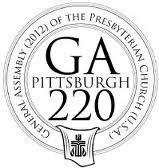 The General Assembly of our denomination, the Presbyterian Church (USA), meets this week in Pittsburgh. At its very best the General Assembly seeks to discern our denominational family’s faithfulness to its call to be a part of one, holy, catholic, apostolic church and to act and propose action that might enhance our witness to the Gospel.
The General Assembly of our denomination, the Presbyterian Church (USA), meets this week in Pittsburgh. At its very best the General Assembly seeks to discern our denominational family’s faithfulness to its call to be a part of one, holy, catholic, apostolic church and to act and propose action that might enhance our witness to the Gospel.
I make no secret of my frustration with many of the outcomes of our General Assemblies. Our fidelity to our call to unity, holiness, catholicity and apostolic integrity (that is, our adherence and submission to the word and message first preached by the Apostles) seems to get lost in the clutter. And there is a lot of clutter. Some 800 items of business will come before the 21 committees of the Assembly. Not all of them will be recommended for vote to the whole Assembly and its 688 commissioners. And not all of them seem to have much to do with being a part of the one, holy, catholic and apostolic church.
I will comment after the Assembly has acted on some of the outcomes; already we expect something to be said about Middle East Peace and the nature of Christian Marriage. Specifically there are overtures to condemn Israel as practicing apartheid in its policies towards Palestinians, and to redefine marriage as a covenant “between two people.” These are bold initiatives for our shrinking in numbers and relevance denomination to be taking. Maybe the times call for such boldness. Or maybe we are foolish, seduced by dreams of relevance.
We will say very little about sharing the apostolic faith, this “faith once received,” the good news of the gospel, with our neighbors, family members and coworkers.
One of the items of business to be considered first by Committee 21, Health Issues, will instruct the agencies of the General Assembly and encourage all other Presbyterians to be diligent in our use of “Person First Language.” The advocates of the overture contend that the use of Person First Language is a way of communicating the love and justice of Jesus, especially to persons with disabilities.
I am not sure about the evangelistic aspects of Person First Language, but all in all it seems like a sensible idea and good practice for all of us. Person First Language affirms our common humanity. And so rather than leading with difference, we lead with commonality. The other is referred to as “a person with a disability” rather than “a disabled person” or “a cripple.” My friend is a person who uses a wheelchair rather than wheelchair bound. Person First Language has common sense and human decency on its side.
But not everyone likes Person First Language. While originally intended for use in reference to persons with disabilities, there were attempts to apply it more broadly to racial, ethnic and national identity, as well. Those attempts have failed. To be an African American is different than being a person of African descent. To be Irish is more than being a person with Irish ancestors. Racial, ethnic and national identity shapes and helps us understand who we are.
Among the communities of persons with disabilities, there has been strong and notable pushback from the deaf community in particular. Many persons with hearing loss identify themselves as deaf. Deaf is a personal and cultural identity. To be deaf, they say, is more than just being a person who doesn’t hear. It is shapes and forms your very being.
Likewise many advocates prefer to identify someone as autistic or Down’s rather than a person with autism or Down’s Syndrome. It is who they are.
I assume that Overture 21-02 on the use of Person First Language will pass the General Assembly with little notice, hardly seen in the clutter of business before the folks in Pittsburgh. I’m all for the common sense and human decency part of the overture, but suspicious of the bureaucratic and do-good overreach.
The General Assembly will adjourn a week from tomorrow having done or not done whatever damage it will or will not do. But I going to keep thinking about People First Language.
There might be occasions where we would best describe ourselves as persons who follow Jesus, persons who have hope beyond measure, persons who have met Love face to face. But at the end of the day, I think I need to stick with Christian. Yes, call me Christian.
